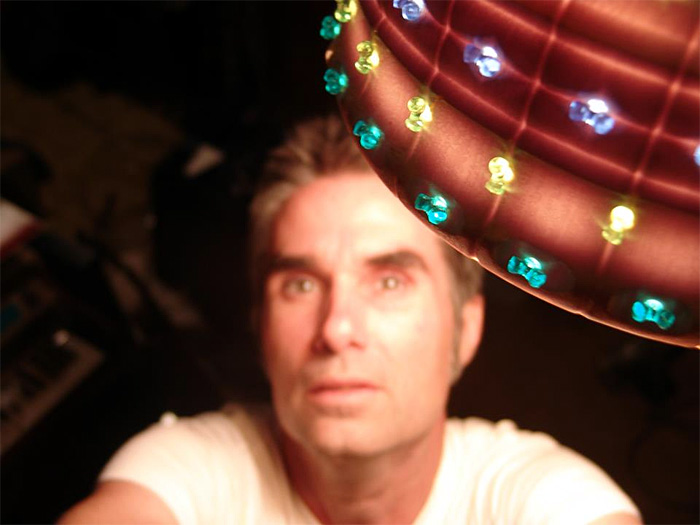Itinerant American songster Jim White sets his guitar cases down at The Glee Club this evening, but Martin Longley caught him up in York last night…
Jim White
Fibbers
September 18, 2013
Three hours of oddball Americana. Well, the evening’s opening act is a local songster, but Boss Caine sounded like he was growling deeply from across the Atlantic. He was followed with virtually no pause by Paul Fonfara, who offered five of his very different songs. Then Fonfara returned, only minutes later, as Jim White’s versatile sideman. So from 8pm to 11pm, the steadily accumulating audience had a surfeit of songs to digest, with hardly any pause for contemplation. Bargain sonics, yes, but demanding on the concentration. Fortunately, each of the artists were sufficiently individualist to lock horns with this challenge.
Boss Caine’s voice lies on the edge of affectation, with its sustained gruff burr, after Tom Waits, Leonard Cohen or even those chaps from Tindersticks and Morphine. He keeps it on just the right side of natural, though, sounding committed in his morose, morbid, wistful and heart-sore material. Caine’s acoustic guitar pick-up developed a recurring fault, so Fonfara provided his own shiny red, hollow-bodied electric, shifting the sound-spread mid-set. This allowed the guitar to speak with as broad a tone as Caine’s voice.
Fonfara began by layering up clarinet phrases, then slowing each one down with his effects pedal, thickening and lowering the sound as he progressed. He switched to guitar and sang along, higher and more dispersed than Caine. An allegedly samba-derived song called for retuning, forcing Fonfara to speak to the crowd. He admitted that such activity was the forté of the soon-coming White. The next bout of tuning was conducted discreetly under the recorded birdsong of a loon, which laid the foundation for his final loop-building creation, before ending up with the clarinet once again. Fonfara’s unique stylings could still be heard as some gentle perversion of Americana into modern, individualist song.
Before too long, Fonfara returned to the stage with White, both of them sat on 1970s-style swivel chairs, prompting White to suggest that the pair interview each other in chat-show fashion. White is the one who would provide all the tall tales, that’s for sure. Only part of his set was devoted to singing songs, with story-spinning almost taking on equal stature. Several ditties demanded this background, as White invariably has a narrative content to his compositions. The transition was entirely natural, from words to words-and-music. Country music might be the heart, but White is mostly a singer-songwriter who crafts his own structures. There might be a clipped, low-volume punkiness to some guitar figures, or a shimmering sub-surf reverb, or a twangy hillbilly clarity. He might be a long-lost sibling to David Byrne, he might look like an older Jon Spencer, but White mostly stands alone. His songs are made possible by a tendency towards outsider lonesomeness, but he also depends on the observation of friends, associates and sometimes complete strangers. He’s a documenter of folks who are even quirkier than himself.
White talked about how much he’s always incessantly talked, hoping that he’ll wind down into near-silence by the time he reaches the end of his road. This is apparently some kinda ambition. Not on this evening, though, even though this was a preamble to his lone instrumental piece. He sang or talked about his old days as a New York cab driver, about his old buddy Harry, about his dreaded adventures at the Capri Motel, about Cat Stevens 8-tracks and the repeated car-thefts of same, about the self-fulfilling crime-names he found in the newspaper’s hidden felony column, when he was almost at the end of life’s tether. White brought three guitars on tour, whereas Fonfara only brought one, although Paul also had room for an extra bass clarinet, which he used to widen their duo palette. White sang with a bold authority, drawing the mostly-seated audience around his imaginary campfire. The songs unwound, the tales rambled eloquently, and before we knew it, White had been onstage for around 105 minutes. That might have been a touch too long, but this was mostly due to the hour’s worth of songs already offered by Caine and Fonfara. This was a night of ample riches in both song and story.
